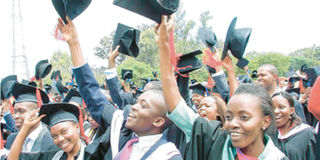Parallel degree programme blamed for declining quality of education

University of Nairobi graduands raise their caps during the institution’s 38th graduation ceremony yesterday. More than 3,500 graduands were awarded degrees and diplomas in various fields. Photo/STEPHEN MUDIARI
What you need to know:
- Prime Minister Raila Odinga was first to express concern, saying that university education was so commercialised
- University Academic Staff Union says that lecturers are overwhelmed by the large number of students
- Federation of Kenya Employers says the quality of local graduates seeking employment was wanting
The quality of education in public universities has been watered down by the introduction of parallel degree programmes, a section of leaders and players in the sub-sector have warned and are now calling for urgent measures to stem further decay.
Prime Minister Raila Odinga was first to express concern, saying that university education was so commercialised and that it was fast becoming a preserve of the rich.
“University education seems to benefit only the rich. For instance, the number of students who join the University of Nairobi because they can pay are more than those who get admitted because of their good grades,” said Mr Odinga.
The University Academic Staff Union says that lecturers are overwhelmed by the large number of students and cannot deliver to the expected standards.
Numerous cases
“Ideally, a lecturer should supervise two masters’ students and one doctorate student, but currently we have numerous cases where a lecturer is supervising 45 masters’ students and five doctorate students while at the same time teaching undergraduates,” the union secretary-general, Dr Muga Kolale, told the Nation.
“We cannot talk about quality assurance when universities are ill-equipped, lecturers are overworked, libraries have no books and journals and research is not being carried out,” he added.
The Commission for Higher Education has also stepped into the debate, with its secretary, Prof Everett Standa, saying that the thirst for money in public universities has overlooked issues of practicalities when admitting students.
The Federation of Kenya Employers says the quality of local graduates seeking employment was wanting, reflecting the declining standards in the universities.
“Many graduates cannot even express themselves. We even have more graduates in a particular field than the market needs. Universities should consult with employers to identify areas that need capacity,” said FKE chairman, Mr Patrick Obath.
Investigations by the Nation revealed that there were serious challenges in the institutions of higher learning, with students in the self-sponsored programme hiring their regular counterparts to write for them term papers and projects.
But university administrators have dismissed those rubbishing the programme initiated 10 years ago, saying that it has contributed immensely towards the financial stability of public universities and enabled them to supplement funds received from the Exchequer.
Currently, students enrolled under the self-sponsored programme are the majority in many public universities. The University of Nairobi has the highest number of learners under the privately-sponsored students programme with 32,010 out of a total 44,914.
Kenyatta University has 11,568 out of 20,426 while Moi University has 50 per cent of its 16,000 students in the programme. At the Jomo Kenyatta University of Agriculture and Technology, there are 4,590 students in the self-sponsored programme and 3,372 in the regular programme.
Egerton University with 12,000 students, has 4,000 students enrolled in the parallel programme. In Maseno, 60 per cent of the students are self-sponsored.
“Without the parallel programmes, operations in public universities would have ground to a halt a long time ago. Fees charged for the various programmes now contribute more than 60 per cent of the budgets of all public universities,” the University of Nairobi vice-chancellor Prof George Magoha said.
Prof Olive Mugenda, the vice-chancellor at Kenyatta University, says that the parallel programme gives students who meet university admission requirements an opportunity to pursue further learning.
“The number of students left out is unacceptably high for Kenya’s economic development and social well-being. These students have every right to pursue higher education. And if they can pay for it, I see no problem,” said Prof Richard Mibey, the vice-chancellor at Moi University.
“Parallel degree programmes expand access to higher education and rein in capital flight,” said Maseno vice-chancellor, Prof Fredrick Onyango.
“This programme is the best thing that ever happened to the education sector in this country,” says Masinde Muliro University vice-chancellor, Prof Barasa Wangila.
A spot check of the universities by the Nation revealed that overcrowding was rampant in lecture halls while access to library facilities has become virtually impossible as students compete for the few books available.
The constraints have given rise to hostility between the regular and parallel students with the former expressing bitterness over what they termed as ‘a raw deal by the administration’.
There is a general feeling among the regular students that the self-sponsored programme was for the rich as they were able enrol for degree courses considered to be lucrative, despite the fact that they (regular students) had performed better.
They are also expressing dissatisfaction over how the two programmes were run, saying that they took twice as long to complete their courses compared to the self-sponsored students.
Additional reporting by Watoro Kamau




